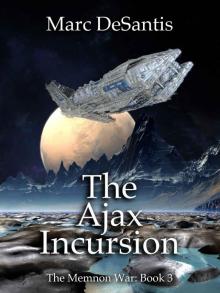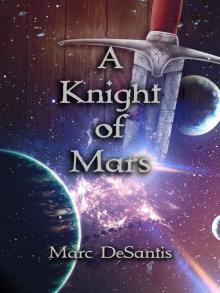- Home
- Marc DeSantis
The Memnon Incident: Part 3 of 4 (A Serial Novel) Page 3
The Memnon Incident: Part 3 of 4 (A Serial Novel) Read online
Page 3
"I would have expected they would have written more about it," Venn said. "When Morrigan spoke to us, she mentioned the Alliance and the Procyon Empire. Could those have been her enemies?"
"Maybe those were her own affiliations," Chandler said. "Who knows? I've never heard of either."
"There is a star named Procyon," Howell said. "Somewhere."
"Then it seems to have acquired an empire at some point," Chandler said. "Not sure when or where."
It was one of the maddening things about galactic history, Howell knew. There was so much of it, and the destruction that had attended the falls of the four Numbered Empires had been so extensive that most knowledge of it had been lost except for some names and dates, and not a whole lot else. In between and coeval with the great Numbered Empires had been a welter of lesser empires, kingdoms, dukedoms, republics, mercantile leagues, alliances, single-system strongholds, independent worlds, and several other state types. These latter included multiple world industrial consortia and nomadic fleets of ships that eschewed putting down roots on any planet or in any system and instead traveled through space in giant collections of spacecraft. There was a legend of the so-called Golden Fleet of King Bertrand the Great. In a swarm of ships the Golden Fleet cruised through space in centuries-long tours, stamping our piracy and delivering justice to wicked rulers by plasma cannon. The Golden Fleet, it was said, was so large that none dared attack it. Local lords and potentates quickly bent their knees when the courageous Bertrand arrived on their systems' doorsteps.
The story was largely a myth, though Howell allowed that it might be based in part on real history. Perhaps there had been a relatively powerful fleet of gold-painted ships that had brought a measure of peace and security to a sector or two during one of the dark ages. That the wise and noble Bertand seemed to have lived for centuries, far past the attested lifespans of humans, spoke more to the popularity of the legend than to the truth of Bertrand's activities.
Howell wondered what might remain in Morrigan's memory. It was clear that she recalled some of the events of the past, and given the pain that she seemed to be in, they could not have been pleasant. There was no way to contact her directly. They had tried calling out to her, shouting sometimes, but Morrigan had not responded. That she could hear them, on occasion, was certain. She knew their names, having used them when she had spoken to them previously. That meant that she had listened to their conversations for some length of time. She had understood that they were not her own crew, but had not been able to determine that they were not from her own era. The best supposition was that the Alliance and the Procyon Empire had not been part of Morrigan's own political affiliation, whatever that was, or else she would have recognized them. Did that mean that they had been enemies? Not necessarily. The Alliance and Procyon might have been alternative political structures coexistent with that of Morrigan. It was also not certain that Morrigan was actually a ship of the Second Empire as that term was understood in later millennia. It might have been a vessel of an interstellar state that had existed during the same period. No galactic empire had in fact ever controlled all of human space. There had always been dominions governed by other rulers.
Material retrieved from Morrigan indicated that she had once been a ship of the Rigelian Empire. Oddly, many of the markers that pointed to this affiliation had been removed, as if the crew had attempted to deny Morrigan's true origin. The numbers given to the ancient starfaring empires of the galaxy were largely anachronistic, labels applied to polities that had their own names for themselves. The Cordelia, a small but prideful workhorse warship of the Third Empire, refused to acknowledge belonging to such an entity, and instead consistently and repeatedly asserted, down to this very day, that she was a ship of the navy of the Empire of Eridani. The extent of the Eridanian Empire matched that of the known Third Empire very closely, so Halifax's historians were quite sure that they were one and the same.
Cordelia refused to concede this point in any way. She had also firmly refused to be referred to as the 'Republic of Halifax Ship' Cordelia, seeing this as a betrayal of her true allegiance to her Imperial Eridanic Majesties. At her insistence, she had never been added formally to the Naval Register of Halifaxian warships, instead accepting a fighting role with the RHN as a matter of an alliance of putative equals. It had been obvious to Howell, who had several times had the opportunity to converse with Cordelia, that she deemed it a mighty favor to the Halifaxians that she deigned to fight alongside them or accept their naval personnel aboard her. Every now and again she would issue stinging critiques of her crew's performance, sometimes going so far as to call into question the fitness of her captains for command. No one who had ever sat in the captain's chair escaped her withering analyses. The ill-tempered Cordelia had never been a popular command, though as the most technologically advanced ship Halifax had she had kept her place in the fleet unchallenged for several centuries.
Though Cordelia had on several occasions called Howell a 'bumbling half-wit' and a 'moron' she had instructed him as well as she could on the finer points of her reactor and how it meshed with her drive system. Like Morrigan, Cordelia had been damaged in her final battle during the Time Before, but had not suffered the severe damage to her personality that Morrigan had. Cordelia's displacement drive and maneuver drives had been wrecked in battle with Cythera, a breakaway empire of 'renegade curs' and 'ignoble trash,' as she described it. Her surviving crew had gotten off but had never returned for her. She had drifted through the void for thousands of years, finally crossing into the Gulf that separated the Great Sphere from the rest of the galaxy, where she was found by a patrolling RHN destroyer.
There was so much else that Cordelia had given to Halifax. She had contained a wealth of cultural and historical information about the Third Empire, and so the four millennia of its efflorescence were remarkably well known to Halifaxian scholars. Cordelia could tell them little about earlier periods. The far earlier Second Empire had been lost in the mists of time by the start of her own era, and the First Empire remained just as mythical to her as it was to Howell and his contemporaries. It had been suggested that the First Empire had not been an empire at all, but some great federation of worlds established in the first massive exhalation of Terran colonization. Where it had been was not altogether clear, as the location of Earth was not known in Cordelia's time. The road home to humanity's birthworld was lost, possibly forever.
The Lady of the Lake, a battleship of the Fourth Empire, was unlike Cordelia in almost all ways. Where Cordelia was a spitfire, the Lady of the Lake was a regal machine, grand and stately in her manner. Her crews served aboard her with great pleasure, and she was, despite being technically less-sophisticated than the older Cordelia, the most coveted of commands in the RHN. Howell surmised that the ancients had designed the personalities of their warships to suit their missions. Cordelia had been meant for independent operations far from the main fleet - she insisted at all times that she was a 'frigate' and should be left free to range across the stars hunting for enemies - while the Lady of the Lake had been the core of a battlefleet of the Fourth Empire. Her preferred designation for her original affiliation was the Hegemony of Catana, a state that had once held sway over the greater part of all human worlds. She understood and accepted that Catana had also been the fourth great human star empire, so the custom of designating such polities according to their number had entered into galactic historiography by her era.
The Lady was an optimistic and hopeful soul, Howell had found when he had been aboard her. Though her galaxy had been less wealthy than that of the earlier Third Empire, she displayed a nobility and empathy that Cordelia lacked. She had been at the forefront of the fleets of the Catanan Hegemony during its glorious time of expansion. She had reclaimed thousands of lost and lonely worlds, crushing their petty tyrants and bringing them back into the light of a renewed galactic empire. She had been lost at the height of these wars of restoration, as she called them, when she had suffered a disp
lacement drive mishap while on an exercise. Her skeleton crew had abandoned her, and she had displaced to avoid endangering a nearby inhabited world. She too had been lost for millennia, but in the bizarre realm of hyperspace, not the cold void of realspace. She emerged at last in a dust cloud situated in the Great Sphere, thousands of light years away from where she had originally displaced. Like Cordelia, she had had time while drifting alone to mentally adjust to the drastically changed conditions into which she now found herself.
"It would be a good thing if we could talk to her," Venn said as she brushed dust off of the console. "She doesn't seem to know what's going on outside."
"With the RMN here, you would think she would be worried that they will try and board and take her for themselves." said Chandler. "Everyone else who has come across her has."
"I'd love to talk to her too," Howell agreed, "but she does not have a high regard for us. She talks about killing us, remember? We're also her hostages, of a sort. Maybe its best we let her sleep some."
"I've dealt with patients in comas before," said Venn. "Sometimes they can hear others, they just can't wake themselves up. What if," she ventured, "Morrigan is slipping in and out of a coma-like state. Not a true coma, she's not biological, but something akin to it? That would explain why she comes and goes for long stretches. Also why she seems to know a lot about us. She's listened to us as we worked aboard her. She may be listening to us right now."
Chandler nodded. "But unable to maintain a continuous state of wakefulness so that she can interact with us. It's plausible. On occasion, other examples of Amy's model have displayed some eccentricities and quirks, including periods of somnolence, if that is the right word for it. We usually just say that the shipbrain has gone offline for a while. It's possible that, in her damaged state, Morrigan is undergoing similar periods of intellectual submergence. Morrigan is vastly more advanced than Amy, and her complexity might also make it more challenging for her to regain her balance. If she were simpler, she might be able to find a way to work around all of the damage she has sustained. As it stands, her injuries are so extensive that the remaining systems open to her are inadequate to her present needs."
Venn was slackjawed. "I knew you had a brain in there somewhere," she said. "It's about time I got to see you use it. You must have studied some at the Academy. Not that I ever saw."
"Every now and then I can sound intelligent, thank you. Technical intel, that's my specialty, you may recall."
"Okay, so you don't care for each other, even if you really do," Howell said. "Time to change the subject. What can we do to make her wake up? We could use her help right away."
"She seems to respond to negative stimuli," Chandler said. "Perhaps if we goaded her sufficiently, she might rise to consciousness."
Venn frowned. "That's dumb."
"I have to agree with the Lieutenant Commander," Howell said, rapidly tapping the holographic projection surrounding his wristcomp. "I have logged at least seven known instances in which Morrigan either killed, or tried to kill, someone whom she did not like. She did try to take you out. I hope you haven't forgotten that."
"I haven't forgotten," Chandler assured. "My head still aches. What if we avoid doing anything that might be construed as harm, and instead simply caused some problems that aroused her from slumber?"
"What do you have in mind?" asked Howell.
"What if we kept opening and closing doors," Chandler suggested, "and sent the lifts up and down as many times as we could, played loud music, whatever? Did everything to make ourselves a nuisance, but not a threat."
"Morrigan might die laughing at the sophomoric nature of your antics," Venn said. "Why don't you light a fire too."
"I am not going to say it has no chance of working," Howell said, "but I would rather not try it with a ship that has already vented plasma onto people she took a dislike to."
Howell began to pace around the bridge so that he could think. He locked eyes with Lieutenant Jenkins, who huddled with his marines in one corner of the bridge. The marine in his massive power armor looked so superior, as if he owned the whole ship, even though he was just as much a prisoner of Morrigan as the rest of them. He was talking in a low whisper with Sergeant Cone until he noticed Howell's interest in him. "Can I help you, Mr. Howell?" he asked.
"Maybe, lieutenant." Howell pointed to the targeting device, which hovered several feet away. "Battlecode, it's very old, correct?"
Jenkins nodded. "Older than dirt, I am told. It goes back to Old Earth, and the days before spaceflight."
"The benefit of battlecode is that it is known to all, and so you can send a message, in the clear, to anyone who understands it?"
"Yes, just as I did with the Steadfast. It's a basic code, but it isn't enciphered. There is no security attached to it. Anyone who can pick up a battlecode signal can read the message if he understands battlecode. The RMN is watching, so unless we can send it directly to Steadfast, or one of our own ships via this thing's laser, Memnon will pick it up too.
"They can understand battlecode?"
"Of course, everyone can. That's the great value of it, everyone understands it."
"And it, or versions of it, have been around since forever, right?"
"Just about."
"So what's are the chances that Morrigan understands battlecode?"
The lieutenant sat up a little straighter. "I'd say pretty good. But what do you plan to say to her with it? If she can't hear us talking to her as we are now, why would she respond to battlecode?"
"Perhaps I am grasping at straws," Howell admitted. "I am wondering whether such a basic form of communication might be more readily heard by her. She can sense something, now and then. What if we tried sending her a message via code. It would almost be like a neural stimulus, like an itch that she would have to scratch. Especially if the message were dramatic and dire all at the same time."
"Maybe we could say 'boo' to her," suggested Cone. "It would serve her right. She's been scaring us enough as of late."
Jenkins ignored his sergeant. "Then how do send this message to her? It's a series of long and short signals. Do we tap it against the wall? Flash it against the vidscreen? We could hum it if we had to. But will she pick it up?"
"Could it be transmitted as electrical pulses?"
"Of course. That was how it was sent in its earliest days, along wires running for miles aboveground or beneath the sea. Do you have something that you could link to Morrigan's systems?"
"I could use my wristcomp?"
"Do you want to get so close to Morrigan?" Jenkins questioned. "You can't do this wirelessly. You would need a physical link. Didn't she zap that Chandler fellow today when he came in contact with it?"
"You're right," Howell acknowledged, glancing at the hovering targeter drone, "but you have something that might fit the bill."
Jenkins considered the little drone for several seconds. "We have nothing to lose. Let's give it a shot." He smiled briefly. "I think I have a message that might get through to our hostess."
Chapter Twenty-Five
Memnon system
Imagawa's inverted Wildcat streaked above the Memnonian fighters, peppering them with gauss pellets and scoring them with laser blasts. The initial shock of their reverse course had faded, and the Memnonian pilots had regained their balance. Imagawa had nonetheless taken out two more, and Percy had destroyed one, but that left twelve Memnonian machines against their two. The matchup, she knew, did not favor her or Percy in the long run.
The Wildcat was a beast of a fighter, meant for high speed cruises, long loitering times on station, and vast, long range firepower, which came mainly in the form of the four Iron Lance missiles that it carried. Every fighter, every warship, indeed, every machine intended to take part in combat, was designed with a purpose, or perhaps several purposes, in mind. The F-243 was a heavy interceptor. Though it could maneuver fairly well, its role had always been that of the attacker from a distance, launching strikes on targets
while they were still outside of their own ability to retaliate, and well away from the valuable ships of the fleet. The Iron Lances, though not equipped with nuclear warheads, were still so potent that they could pose a real threat to small warships, such as corvettes and destroyers, especially if they were caught unshielded. The Iron Lance was also a stealthy weapon, and it was often able to penetrate a defensive screen of enemy fighters and sensor-equipped early warning spacecraft to hit its target. So though the Wildcat had been conceived as a defensive fighter, it possessed a considerable offensive punch by virtue of its extraordinary unrefueled range and the gargantuan missiles it hauled.
The Wildcat was well-armored too, making it a tough opponent to knock out, but this extra protection added weight that reduced acceleration and maneuverability. These last were the fundamentals of space fighter combat in the classic sense that most people in the Great Sphere envisioned it to be. Two speedy fighters clawing their way through the void, firing cannons and missiles at each other in a so-called dogfight. That certainly happened, but it was not the whole of what fighter combat entailed. It had been Halifaxian doctrine for generations to avoid dogfighting unless absolutely necessary. The Republican navy had invested quadrillions of obols developing, testing, and then fielding the most advanced armaments to be had in the Sphere. Nearly every one of these weapons gave the edge in range and firepower to the Halifaxian warfighter, whether he or she was a fighter pilot, a ground-pounding, power-armored marine, or a ship captain. Halifaxian war was not intended to be made up-close and personal. That was for less-sophisticated militaries. The Halifaxian way of war was to strike from a distance, hit hard, and finish an opponent before he could retaliate. It had been an effective and undeniably successful method of fighting. Halifaxian combat doctrines had set the standard for the Sphere for centuries.
Unfortunately, those sophisticated fighting techniques could do little for Imagawa and her wingman Tom Percy. The RHN envisioned having the information edge over the enemy in combat - its own ships and fighters would spot the enemy long before the enemy saw them. If the opponent was too strong or too numerous, then Halifaxian fighters were either to summon aid or run away. Within the dark reaches of Memnon's Oort cloud, however, it had been the Memnonians who had found Imagawa's tiny patrol first. For too long had Captain More's squadron hung around in-system. There had been an excellent reason to do so, Morrigan was a prize beyond all measure, but this had increased, with each passing standard day, the likelihood of detection. Instead of RHN fighters falling upon an enemy caught unaware, the enemy had fallen on Imagawa and Percy. In all probability, the squadron had tickled the sensors of an automated warning station somewhere in the cloud, and this had sent a message back to Memnon's naval higher-ups. The RMN fighters had approached carefully, with their presence being detected by the Wildcats' only after they had been painted by their targeting systems.

 The Ajax Incursion
The Ajax Incursion The Memnon Incident: Part 2 of 4 (A Serial Novel)
The Memnon Incident: Part 2 of 4 (A Serial Novel) The Memnon Incident: Part 4 of 4 (A Serial Novel)
The Memnon Incident: Part 4 of 4 (A Serial Novel) The Memnon Incident: Part 1 of 4 (A Serial Novel)
The Memnon Incident: Part 1 of 4 (A Serial Novel) A Knight of Mars
A Knight of Mars The Memnon Incident: Part 3 of 4 (A Serial Novel)
The Memnon Incident: Part 3 of 4 (A Serial Novel)